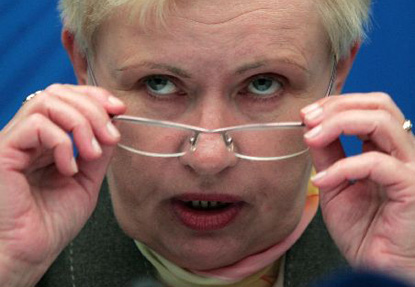 Numerous experts and election observers called the local council campaign a rehearsal of the forthcoming presidential elections – the authorities spared no time and effort to discredit independent candidates, and the official election results were more predictable. For instance, an independent candidate from the Movement for Freedom was groundlessly accused of paedophilia. Another contender, who ran for a seat in a small, predominantly homophobic town, was without any evidence linked to a gay-community. As to be expected, the authorities ignored candidates’ slander complaints.
Numerous experts and election observers called the local council campaign a rehearsal of the forthcoming presidential elections – the authorities spared no time and effort to discredit independent candidates, and the official election results were more predictable. For instance, an independent candidate from the Movement for Freedom was groundlessly accused of paedophilia. Another contender, who ran for a seat in a small, predominantly homophobic town, was without any evidence linked to a gay-community. As to be expected, the authorities ignored candidates’ slander complaints.
The main striking feature of this campaign was a high activity of independent candidates, including the opposition leaning ones. At several districts 7-9 candidates were registered. Sadly most of them played a role of mere extras not in any way hampering a chance for pro-governmental candidates to safely occupy their seat, assigned to them by the regime directors.
The campaign was orchestrated by an amended in January this year Electoral Code. The most significant changes were a zero threshold (even if one voter had showed up at a polling station it would have been enough) and simplified rules for holding campaign rallies.
Changes to the Electoral Code became a point of contention between the EU and Belarus. However, regardless of skin-deep amendments fraud and deviations remained not only ‘a norm,’ but became a widespread practice for making sure that regime’s representatives would remain in key positions.
“The election conducted in a festive manner”  According to the official results more than 79% of voters participated in the election. “The European electorate has a long way to come to reach our level [of participation],” Lidziya Yarmoshyna, the Central Election Commission chairwoman (on photo), declared.
According to the official results more than 79% of voters participated in the election. “The European electorate has a long way to come to reach our level [of participation],” Lidziya Yarmoshyna, the Central Election Commission chairwoman (on photo), declared.
She assured that the election was conducted in ‘a quite, peaceful and even festive manner.’ According to her ‘the CEC had received very few serious complaints.’
The CEC announced that up to one third of all electors opted for an early voting.
Early voting is a characteristic feature of the Belarusian electoral process, which is being meticulously administered and imposed from the top. “Vote early and on a weekend you can relax on a dača (summer cottage), do your house chores.” The authorities explain it as a concern for the people and care for their wellbeing.
Yet there is an opposite side of a coin: early voting ballots are easier to meddle with. That is why the authorities call upon electors to vote early. In the public sector it is even compulsory to vote ahead of the Election Day.
HR defender saw no progress Independent monitoring services documented several instances of conflict situarions related to the election. The election observation carried out by the HR Defenders for Free and Fair Elections campaign concluded that the main tendencies seen in previous elections remained. In particular, it was observed that:
Independent monitoring services documented several instances of conflict situarions related to the election. The election observation carried out by the HR Defenders for Free and Fair Elections campaign concluded that the main tendencies seen in previous elections remained. In particular, it was observed that:
– independent journalists were denied access to information about the elections (on the Election Day an ERB reporter was removed from a polling station and a journalist with Biełorusy i Rynok was detained);
– uneven playing field for candidates’ campaigning – more favourable conditions for pro-governmental contenders than for their independent counterparts;
– high number of voters who opted for the early voting;
– lack of transparency during the vote count: electoral commissions prevented observers from a direct observation of this procedure;
– numerous complaints of independent observers and candidates about fraud and Electoral Code deviations.
“In general, the campaign was characterized by the same spirit as the previous campaigns, with no significant qualitative changes in favour of the democratization of the electoral practices. Just like in the previous election campaigns, the election of deputies of Local Councils of Deputies of the twenty-sixth convocation was marked by a serious systemic retreat from democratic standards for which the Belarusian authorities have repeatedly been criticized,” Belarusian HR defenders concluded in their preliminary monitoring results.
Thus, taking into account serious and en masse deviations the election is difficult, if possible at all, to call free and fair. Yet there is an official position which has proven once again that the right to elect and be elected is not protected in present-day Belarus.


